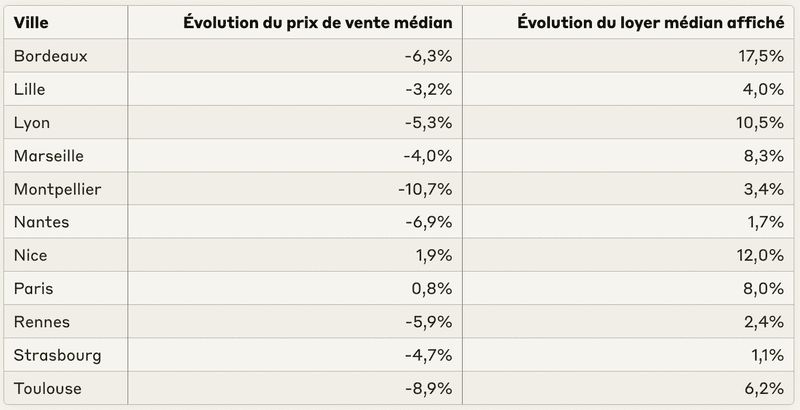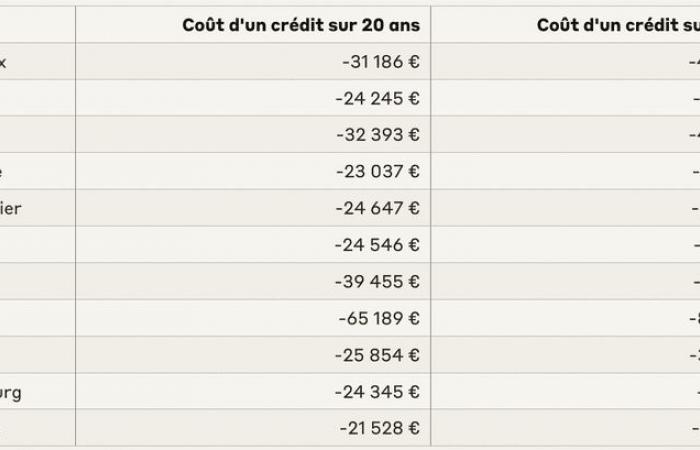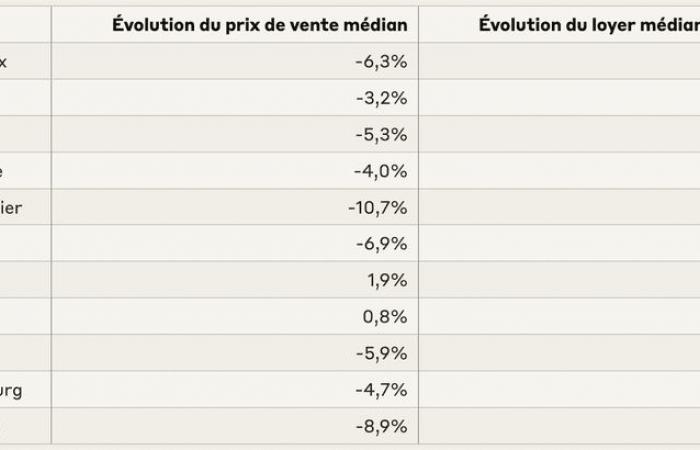Bien'ici unveils its latest exclusive analysis of real estate market trends in major French cities in 2024. While most major metropolises are recording a significant decline, two emblematic cities, Paris and Nice, are resisting this trend with a slight increase. Beyond the figures, this situation raises questions about the factors influencing these variations in real estate prices and their consequences for potential buyers. Economic attractiveness, housing policies, changes in lifestyles: so many essential reading keys to decipher the complexity of the urban real estate market.
Summary :
Trends in median real estate prices for the purchase of a T3
Significant drops in property prices in most major cities
According to the latest figures published by Bien'ici,The median price for the purchase of a 3-room apartment has decreased. This trend concerns almost all major French cities. Furthermore, data for October 2024 shows a decrease compared to the previous year.
The largest declines affect Montpellier, where property prices fell by €29,300.. Then, Bordeaux and Toulouse show similar reductions, with €21,000 each. Likewise, Lyon and Nantes follow with decreases of €18,000, as does Rennes, which records a comparable decrease. Furthermore, Lille (-€8,000), Marseille (-€9,500) and Strasbourg (-€12,000) also show significant declines.
Paris and Nice: two notable exceptions
In this context of generalized decline, two cities stand out by showing an increase in median real estate prices for a T3. Paris shows an increase of €5,000, while Nice records an increase of €7,200. These results demonstrate the resilience of these high-end real estate markets, driven by continued strong demand and increased attractiveness.
Thus, Paris and Nice confirm their status as strongholds of French real estate. These two cities are able to withstand economic ups and downs thanks to their international influence and their ability to attract a premium clientele in search of exceptional properties.
Impact on the cost of real estate credit
More marked reductions in monthly payments over 25 years
The reduction in property prices in most large cities logically translates into a reduction in the cost of credit for buyers. According to Bien'ici calculations, for a 25-year loan, the monthly payments decrease by:
- €141 in Lyon,
- €136 in Bordeaux,
- €108 in Montpellier compared to 2023.
Over 20 years, the declines are slightly less pronounced. However, they remain significant. In Lyon, the reduction reaches €135, while in Toulouse, it amounts to €90.
The extension of loan duration played a crucial role. In fact, this extension, made possible by historically low interest rates, has partially offset the rise in property prices. This made it possible to maintain the solvency of borrowersparticularly in large cities where prices per square meter remain among the highest.
Paradox: Nice and Paris, the biggest drops in the cost of credit
Remarkably, while Nice and Paris are the only large cities to see their median prices increase, they nevertheless record the largest drops in the cost of real estate credit. For a purchase on credit over 25 years, the monthly payments fall by €284 in Paris and €172 in Nice. Over 20 years, the reductions reach €272 and €164 respectively.
These figures result from a combined effect. On the one hand, we observe a slight increase in prices. On the other hand, the drop in interest rates particularly favored borrowers. This dynamic is all the more marked in cities where the amounts invested are higher.
Indeed, in Paris and Nice, the conjunction of a measured increase in prices and a significant drop in interest rates creates a positive leverage effect for buyers. Despite high prices, they benefit from a significant reduction in the cost of credit. This reinforces the attractiveness of these markets for investors and high-end buyers.
Contrasted evolution of sales prices and rents
Fall in median sale prices in the majority of cities
Over the last twelve months, the median prices of 3-room apartments for sale have fallen in most large cities, according to data from Bien'ici.
Montpellier shows the most marked decline, with a decrease of 10.7%. Toulouse (-8.9%) and Nantes (-6.9%) follow closely. Then, Bordeaux recorded a drop of 6.3%, ahead of Rennes (-5.9%), Lyon (-5.3%), Strasbourg (-4.7%) and Marseille (-4%).
Furthermore, Lille experienced a more moderate decline, limited to 3.2%. On the other hand, Nice (+1.9%) and Paris (+0.8%) stand out by seeing their median prices increase.
Increase in posted rents, Bordeaux, Nice and Lyon in the lead
While sale prices are falling, rents posted for a T3 continue to increase in all major cities.
Bordeaux records the largest increase, with an increase of 17.5%. Nice (+12%) and Lyon (+10.5%) also follow with marked progress.
For their part, Paris (+8%), Marseille (+8.3%) and Toulouse (+6.2%) showed significant increases. On the other hand, the increases are more limited in Lille (+4%), Montpellier (+3.4%), Rennes (+2.4%), Nantes (+1.7%) and Strasbourg (+1.1% ).

This divergent evolution of sales prices and rents reflects the persistent tension on the rental market. It is characterized by consistently sustained demand in the face of insufficient supply. This structural imbalance between supply and demand for rental housing persists in large cities. This contributes to maintaining significant tension on the market. Thus, in tense areas, rents remain under pressure. Furthermore, this trend continues despite the observed slowdown in sale prices.
Explanatory factors and perspectives
Weight of attractiveness and local economic dynamism
The trends observed in the real estate market of large cities are closely linked to their attractiveness and economic dynamism. As a recent INSEE study points out, “the most attractive territories, through their employment opportunities, their quality of life or their influence, are more resistant to fluctuations in the real estate market”.
This is particularly true for Paris and Nice, which benefit from constant demand, driven by their status as preferred destinations for wealthy French and international investors and residents.
Influence of housing and urban planning policies
Local housing and town planning policies also play a determining role in the evolution of real estate prices. Indeed, cities that carry out proactive actions in favor of the construction of affordable housing and social diversity manage to better regulate their real estate market. This is the case of Rennes and Nantes, often cited as an example for their initiatives in terms of accessible housing and land control.
Challenges of homeownership for households
In a context of high property prices and rising rents, homeownership remains a major challenge for many households in large cities.
According to a recent survey by the Housing Observatory, “nearly 60% of tenants aspire to become owners, but only 30% believe they can make this project a reality in the medium term”.
The drop in sales prices and the cost of credit observed in most large cities could favor this residential path. Provided, however, that income levels follow and the supply of affordable goods is sufficient.
As summarized by Loïc CANTIN, president of the National Real Estate Federation (FNAIM), “the real estate market in large cities is at a turning point. The trends observed in 2024, between slowdown in sales prices and rental pressure, reveal the contradictions of an urban development model which struggles to reconcile attractiveness, social diversity and access to housing for all. It is urgent to rethink our housing policies to build more inclusive and resilient cities”.








